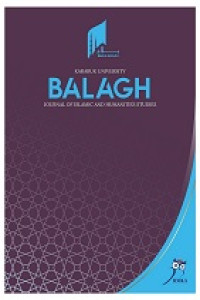Görüntü Sunumu
Araştırma Makalesi
İnceleme Makalesi
Monografi
Amaç ve Kapsam
BALAGH Journal; With scientific research, experimental, descriptive and theoretical studies, scientific articles, texts, thesis, symposiums, seminars, conferences, panels, etc. written in Arabic or English aims to contribute to science by publishing articles.
The Journal’s scope includes:
a. Revealed knowledge sciences: Tafsir and Qur’anic sciences, Hadith, Usul al-Din, Fiqh & Usul al-Fiqh, Siyasah Sharʿiyyah, etc.
b. Human sciences: Psychology, sociology, Arabic linguistics, education, history, etc., all being from an Islamic perspective.
Yazım Kuralları
1. Appearing on the first page will be: the title, names of the student and professor, names of the respective Kulliyyah and Department, and an e-mail address.
2. The article’s title and authors’ names should be written in Arabic and English atop the Abstract page.
3. Articles should include two abstracts, one in Arabic and the other in English, each being a paragraph of length 100-150 words, followed by 5 keywords for each.
4. Articles should include: an introduction, problem statement, significance of study, discussion, and findings.
5. Arabic articles should be written using the “Traditional Arabic” font, size 16, while footnotes are to be in size 14.
6. English articles should be written using the “Times New Roman” font, size 12, while footnotes are to be in size 10.
7. Articles should be 15-20 pages long, with a length of 5000 to 7000 words.
8. Citations should be numbered in a serial fashion, proceeding continuously from the first citation to the last.
9. Citations for each article should follow the Chicago Manual of Style, 16th edition. Refer to the website: http://www.chicagomanualofstyle.org/home.html
10. Citations and quotations of Qur’anic verses and Hadith in English articles should also conform to the following:
- Citations should include the author’s full name, followed by the title in italics;
if the source has been edited, all editors’ names should appear, followed by parentheses containing: City and publisher, edition, and publication date.
Volume (if applicable) and page number come next. If the source is repeatedly cited, the author’s most commonly.
-used name should be cited, followed by the source title, volume (if applicable), and page number.
- Qur’anic verses and Hadith should appear only as translations of their original Arabic texts. No Arabic texts should appear in English articles.
- Qur’anic verses should be in bold letters, followed by the chapter title and verse numbers in parentheses, and not as a footnote. See example:
Indeed, it is We Who sent down the Qur'an and indeed, we will be its guardian. [Al-Ḥijr: 9]
- Quotations of Hadith should be done directly from primary Hadith texts, taking care to classify the Hadith in terms of authenticity, if sourced from any text
other than al-Bukhāri and Muslim. Example: (The one who is proficient in the Qur’an will be with ‘al-Kirām al-Bararah’) see: Al-Bukhāri, Saḥīḥ al-Bukhārī, Kitāb al-Tawḥīd, vol. 9, p. 158.
11. All references should be in English; Arabic sources should be transliterated. Example: Ibn Ḥajar al-ʿAsqalānī, Shihāb al-Dīn Aḥmad ibn ʿAlī. (2008). Tahdhīb al- tahdhīb. Taḥqīq: Ibrāhīm al-Zaybaq, ʿĀdil Murshid. (1st edn.). Bayrūt: Mu’assasat al-Risālah.
12. Articles should be sent as word documents to the journal’s email address: balagh@karabuk.edu.tr
Etik İlkeler ve Yayın Politikası
1. All articles are to be co-authored by a student and a professor, with a short footnote description for each on the Abstract page.
2. The article should be original, not having been published elsewhere, such as another refereed journal or as a chapter in a published book.
3. The Journal is entitled to perform certain modifications to material that does not conform to its guidelines.
Ücret Politikası
Derginin tüm giderleri Karabük Üniversitesi tarafından karşılanmaktadır. Dergide makale yayını ve makale süreçlerinin yürütülmesi ücrete tabi değildir. Dergiye gönderilen ya da yayın için kabul edilen makaleler için işlemleme ücreti ya da gönderim ücreti alınmaz.
Dizinler
Dergi Kurulları
BAŞ EDİTÖR
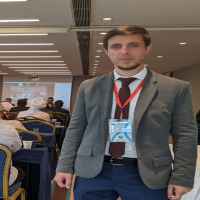
YARDIMCI EDİTÖRLER
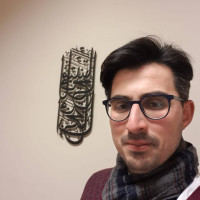
Dr. Öğretim Üyesi. Karabük Üniversitesi, İlahiyat Fakültesi

İslam Hukuku alanındaki ilk doktora derecesini Malezya Malaya Üniversitesi'nden, Arap Dili ve Belagati alanındaki ikinci doktora derecesini ise İstanbul Üniversitesi'nden almıştır. Temel İslam Bilimleri alanındaki yüksek lisans eğitimini (IIUM) Malezya Uluslararası İslam Üniversitesi'nde tamamlamıştır.
ALAN EDİTÖRLERİ

2004-2008 Selçuk Üniversitesi, İlahiyat
2008-2011 Selçuk Üniversitesi, Sosyal Bilimler Enstitüsü, Felsefe ve Din Bilimleri/Din Psikolojisi, Yüksek Lisans
2011-2018 Necmettin Erbakan Üniversitesi, Sosyal Bilimler Enstitüsü, Felsefe ve Din Bilimleri/Din Psikolojisi, Doktora








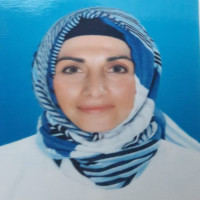
Doktora : Necmettin Erbakan Üniversitesi, Sosyal Bilimler Enstitüsü, 2022. Title: Lise Öğrencilerinde Ateizm ve Deizm Eğilimi Üzerine bir Araştırma(Konya Örneği) (SDanışman: Prof. Dr. Mustafa TAVUKÇUOĞLU)
Master’s Thesis : Necmettin Erbakan Üniversitesi, Sosyal Bilimler Enstitüsü, 2015. İLKÖĞRETİM DİN KÜLTÜRÜ VE AHLAK BİLGİSİ
4. SINIF DERS KİTAPLARINDAKİ HADİS ÇEVİRİLERİNİN ÖĞRENCİ ALGI DÜZEYLERİNE GÖRE İNCELENMESİ (Danışman: Prof. Dr. Mustafa TAVUKÇUOĞLU)
Bachelor’s Degree : Ankara Üniversitesi İlahiyat Fakültesi, 2004.









 Web
Web



 Web
Web
Tuğrul Tezcan 1973 yılında Amasya'nın Merzifon İlçesinde doğdu. ilk, orta ve lise eğitimini Merzifon'da tamamladıktan sonra Ankara Üniversitesinde Lisans eğitimi aldı. Aynı üniversitenin Sosyal Bilimler Enstitüsün'de Muhammed Mütevelli eş-Şa'râvî'nin Hayatı ve Tefsir Anlayışı isimli teziyle Yüksek lisansı, Kur'an'da Şûrâ Kavramı ve Çağdaş Yorumları isimli teziyle de Doktora eğitimini tamamladı. Bu süre zarfında Diyanet İşleri Başkanlığında İmam-Hatiplik görevini üstlendi. 2012 yılında Karabük Üniversitesi İlahiyat Fakültesi Tefsir Anabilim Dalına öğretim üyesi olarak atandı, 2019' da Doçent ünvanını aldı. 2025 yılından itibaren aynı üniversitede görevini sürdürmektedir. Evli ve iki evladı bulunmaktadır.

1984 Konya doğumlu olan yazar ilk ve ortaöğretimini Konya’da tamamladı. Hafızlığını Konya Yıldız Kur’an Kursunda ikmal etti. Mahmut Sami Ramazanoğlu AİHL’den mezun olduktan sonra memuriyet hayatına DİB’da başladı. Önce İktisat ardından da İlahiyat fakültesinden mezun oldu. DİB 25. Dönem Selçuk Dini Yüksek İhtisas Merkezinde eğitim aldı. Sakarya Üniversitesi İslam Ekonomisi ve Finansı ABD’da “İmam-ı Muhammed’in İktisadi Düşünceye Katkısı” başlıklı tez ile yüksek lisansı tamamladı. 2015 yılında SDÜ İlahiyat Fakültesi’ne araştırma görevlisi olarak atandı. SDÜ’de doktora eğitimine başlayan yazar, 2018-2019 yılları arasında Malezya İslam Üniversitesi İslami Finans ve Bankacılık enstitüsünde araştırmacı olarak bulundu. 2021 yılında SDÜ Temel İslam Bilimleri bölümünde “İslami Finans Sisteminin Küresel Mimarisi, Kurumları, Yapısal İşleyişleri ve Türkiye İçin Kurumsal Model Önerisi” başlıklı çalışmasıyla mezun oldu. 2022 yılında Dr. Öğr. Üyesi, 2024 yılında da İslam Hukuku ABD'na Doçent olarak atandı. Aynı fakültede öğretim üyesi olarak çalışmaya devam eden Yurtseven, İslam hukuku ve İslami finans konularında çalışmalar yapmakta olup evli ve 2 kız babasıdır.

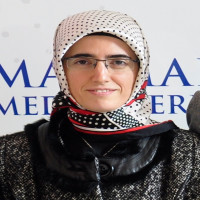
DANIŞMA KURULU

Doç. Dr. Muhammet Fatih CANBAZ
Aslen Zonguldaklı olup, 1984 yılında İstanbul’un Fatih ilçesinde doğmuştur. 2007 yılında Dumlupınar Üniversitesi Bilecik İktisadi ve İdari Bilimler Fakültesi’nden mezun olduktan sonra özel sektörde finans alanında çeşitli görevlerde bulunmuştur. 2008 yılında katılım bankacılığı sektörüne adım atmış; 2014 yılına kadar şube ve genel müdürlük düzeyinde farklı birimlerde görev yapmıştır.
2013 yılında Kırklareli Üniversitesi ve Marmara Üniversitesi’nin ortak yürüttüğü programda İşletme yüksek lisans tezini, 2019 yılında ise Afyon Kocatepe Üniversitesi İşletme Doktora Programı’nı başarıyla tamamlamıştır.
2014 yılında Afyon Kocatepe Üniversitesi’ne öğretim görevlisi olarak atanarak akademik kariyerine başlamış; 2021 yılında Bolu Abant İzzet Baysal Üniversitesi Gerede Uygulamalı Bilimler Fakültesi Finans ve Bankacılık Bölümü’ne öğretim üyesi olarak atanmıştır. 2023 yılında İslami Finans alanında Doçent unvanını alan Canbaz, halen aynı üniversitede lisans ve lisansüstü düzeylerde İslam Ekonomisi ve Finans, Katılım Bankacılığı, Finans ve Davranışsal Finans konularında dersler vermektedir.
Evli ve üç erkek çocuk babasıdır.

1992 yılında Mersin’de doğdu. Millî Eğitim Bakanlığı’na bağlı kurumlarda yaklaşık on yıldır Din Kültürü ve Ahlak Bilgisi öğretmeni olarak görev yapmaktadır.
Van Yüzüncü Yıl Üniversitesi Sosyal Bilimler Enstitüsü Temel İslam Bilimleri Anabilim Dalı’nda Tefsir alanında yüksek lisans (2018) ve doktora (2024) öğrenimini tamamlamıştır.
Yüksek lisans tezini “Kur’ân-ı Kerim’in Âyetleri Işığında Fizikî Coğrafya”, doktora tezini ise “Kur’ân-ı Kerim’in Âyetleri Işığında Zekât, Sadaka ve Faizin Toplumsal Boyutu” başlığıyla hazırlamıştır. Bu çalışmalarında Kur’ân’daki kavramların hem tefsirî hem de sosyolojik boyutlarını ele almış, özellikle zekât, sadaka ve faiz kavramlarının toplumsal düzen üzerindeki etkilerini incelemiştir.
Akademik ilgi alanları arasında Kur’ân’da toplumsal adalet anlayışı, ekonomik ve ahlaki değerlerin Kur’ân’daki temelleri, fiziki coğrafya ve insan ilişkisi, İslami ekonomi düşüncesi ve Risale-i Nur’da sosyal prensipler yer almaktadır. Bu konular çerçevesinde çeşitli dergilerde yayımlanmış makaleleri ve mülakat çalışmaları bulunmaktadır.
Ayrıca Bediüzzaman Said Nursî’nin Risale-i Nur Külliyatı üzerine derinlemesine araştırmalar yürütmekte, özellikle Kur’ân yorumları, ahlaki ilkeler ve toplumsal yapı konularını merkeze alan incelemeler yapmaktadır.

- PERSÖNLICHE DATEN












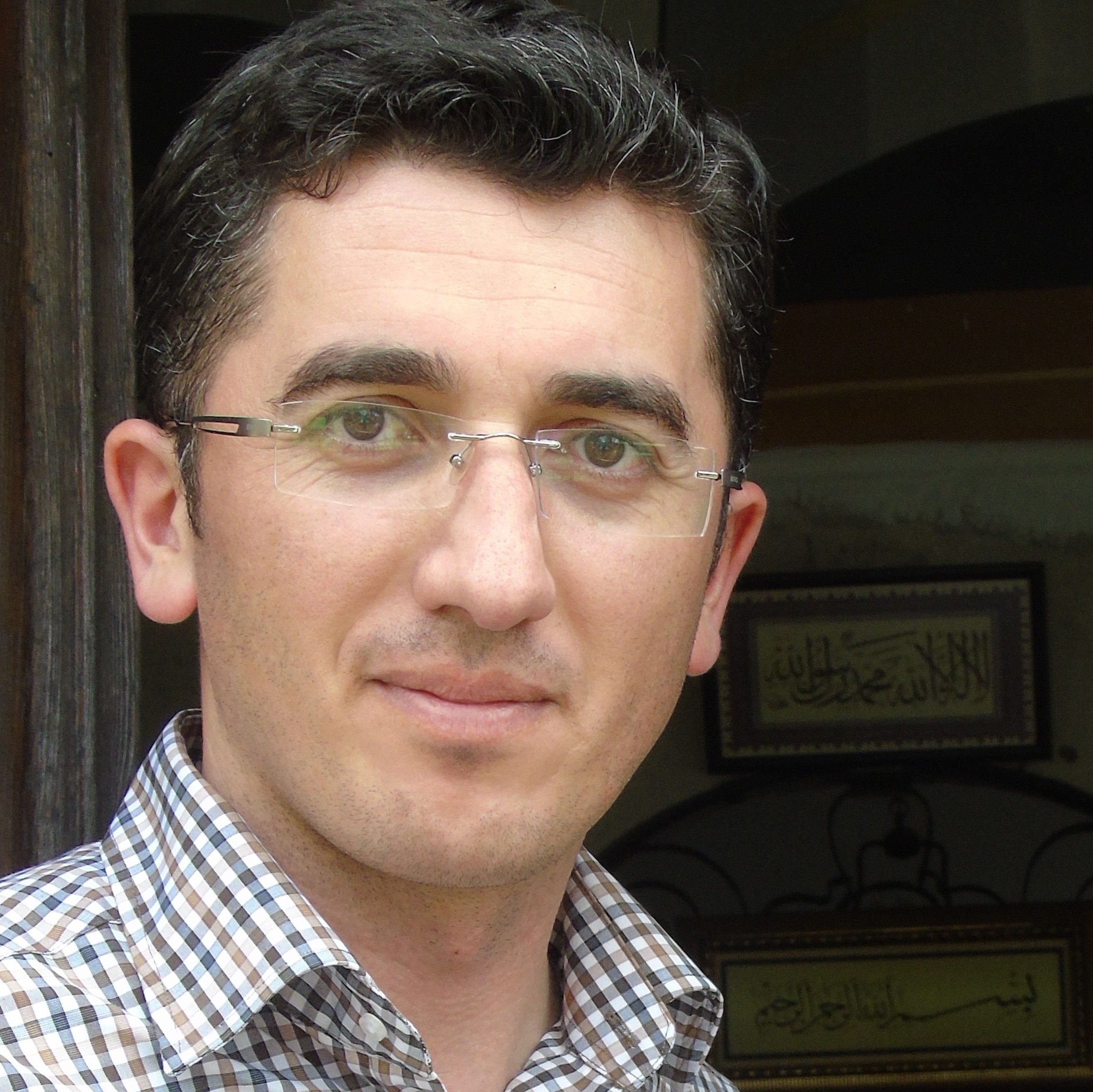

İbrahim Albakkar, Doğum Yeri ve Tarihi : Suriye/Halep – 01.10.1981 Vatandaşlık: Çift Vatandaşlık ( Suriye-Türkiye) Öğrenim Durumu:
- Lisans: İlahyat fakültesi, Şam Üniversitesi, 2005.
-Yüksek Lisans: İslam Hukuku, Jinan Üniversitesi SBE 2011. - Doktora: İslam Hukuku, Sakarya Üniversitesi SBE 2021.
Yüksek Lisans Tez Başlığı ve Tez Danışmanı: İslam fıkhında azalan ortaklık (uygulamalı çalışma), Danışman: Dr. Muhammad Husam Rhima.
- Doktora Tezi Başlığı ve Danışmanı : Fiilî Davranışların Mâlî İşlemler Üzerindeki Etkisi: Danışman: Prof. Dr. Soner Duman.
Hakemli Makaleler:
-Prof. Dr. Soner Duman, İbrahim Albakkar - Mülkiyetin Sebebinin Tebeddülü ve Bu Tebeddülün Etkileri - Bilimname Dergisi – 2019, 38/2019, 725 – 747.
-İbrahim Albakkar, Nader A.M.Falyouna, İradeyi İfade Etmede Halin Delaletinin Etkisi (Mali Muamelat Örneği), Eskişehir Osmangazi Üniversitesi İlahiyat Fakültesi Dergisi, 2020, 7/12, 9-50.
-İbrahim Albakkar, Fares Zaher, Islamic View Over the Marketing Sales in Online Shopping -Upselling and Cross-Selling as A Model, Humanitarian and Natural Sciences Journal, 2021, 6/2, 309-326.
-İbrahim Albakkar, Fadi ŞUŞAN, The Asylum Right in The Islamic law and the International Organizations (İslamHukuku İle Uluslararası Kuruluşlar Arasında İltica Hakkı), Humanitarian and Natural Sciences Journal, 2021, 8/2. 625-609
-İbrahim Albakkar, Impact of implicit expression on the necessity of financial contracts "applied Examples" (Mali akitlerin Lüzumunda Zımni İfadenin Etkisi " uygulamalı örnekler"), Ibn Khaldoun Journal for Studies and Researches, 2021, 1/1, 282 -305 .
-İbrahim Albakkar, Hanefi Mezhebinde İradr Beyanında Yapılan Ses Seviyesi (Satış Akdi Örneği), Eskişehir Osmangazi Üniversitesi İlahiyat Fakültesi Dergisi, 2022, 9/1, 628-650.
-İbrahim Albakkar, Abbas Hussein The “Custom is Settled” Rule: Its Effect on Financial Transactions as an Example, Ibn Khaldoun Journal for Studies and Researches, 2024, 4/7, 36-56.
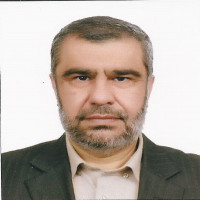
ARAPÇA DİL EDİTÖRÜ

1990 yılında Hatay'da doğdum. 2008'de İstanbul İmam-Hatip Lisesi'nden 2013'te İstanbul Üniversitesi İlahiyat Fakültesi'nden mezun oldum.
2014-2019 - yılları arasında Meb'de Din Kültürü ve Ahlak Bilgisi öğretmeni olarak görev yaptım.
2019 yılında Karabük Üniversitesi İslam Tarihi ve Sanatları Ana Bilim Dalı'nda Siyer-i Nebi ve İslam Tarihi Bölümü'nde Araştırma görevlisi olarak çalışmaya başladım.
Yüksek Lisansımı 2020 yılında Çukurova Üniversitesi'nde "ERKAM B. EBÜ’L-ERKAM’IN HAYATI VE İLK İSLÂM TOPLUMUNDAKİ YERİ" adlı tezimle tamamladım.
Halen Sakarya Üniversitesi'nde İslam Tarihi alanında doktora öğrenciliğim devam ediyor.




